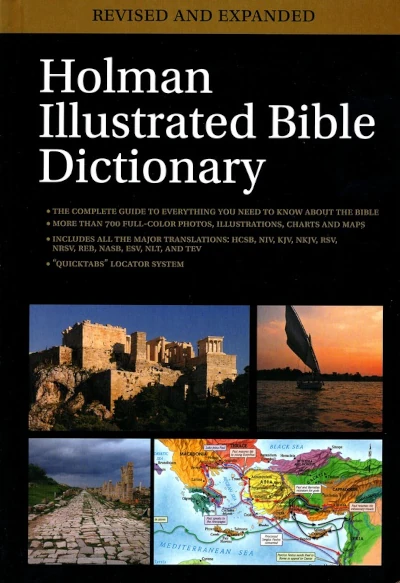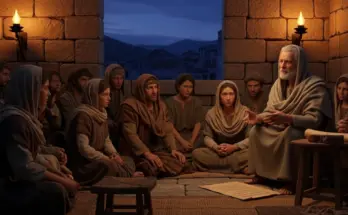Exodus 20 is one of the most significant chapters in the Bible because it records God’s giving of the Ten Commandments to Israel. These commands reveal His holiness and define how His people are to live in covenant with Him. At Mount Sinai, God spoke directly to the people, establishing the moral foundation for their nation and faith. This moment marked a turning point in Israel’s history. The God who rescued them from slavery now taught them how to live as His chosen people.

Let Everything That Has Breath Praise the Lord
Add a Christ-centered touch to your walls with a decal that inspires worship and keeps God’s praises always before you. Celebrate His presence daily with a beautiful wall decal that reminds you and your family to lift your voices in worship. Get Yours on Amazon
When we study Exodus 20, we see that these commandments are not merely ancient rules. They show God’s unchanging character and His desire for relationship. They teach us how to love Him with all our heart and to love others rightly. Each command reflects a moral truth that still applies today. Jesus summarized them with two great commands: love God and love your neighbor.
As we explore Exodus 20, we will look at the setting, each command, and Israel’s response. Through it, we learn what it means to walk in obedience and holiness before the Lord, not by fear but through faith and love.
God Speaks from Mount Sinai (Exodus 20:1–2)
Before giving the Ten Commandments, God reminds Israel who He is and what He has done. “And God spoke all these words, saying, ‘I am the Lord your God, who brought you out of the land of Egypt, out of the house of slavery.’” These opening words establish the relationship behind the law. God does not command strangers; He speaks to His redeemed people. The law is rooted in grace, not oppression.
By declaring Himself as the one who brought them out of bondage, God frames obedience as a response to deliverance. The commandments are not a means of earning favor, but a guide for living in covenant relationship. In Exodus 20, we learn that God first saves, then instructs. His law shows how redeemed people should live in freedom and righteousness. It calls us to remember who He is, our deliverer and Lord. The same pattern applies to us today. God saves us through Christ, then teaches us to live by His Word and Spirit.
1st Commandment: No Other Gods (Exodus 20:3)
The first commandment lays the foundation for all the others: “You shall have no other gods before me.” This is not only a command against idol worship but also a call to exclusive devotion. God’s people must worship Him alone. In the world of ancient Egypt and Canaan, where many gods were worshiped, this command set Israel apart. It declared the truth that the Lord is one and there is no other.
Exodus 20 reminds us that God’s relationship with His people is based on loyalty. To worship another god is spiritual adultery. In our modern world, idols may not be statues, but anything that replaces God in our hearts, wealth, status, or self, violates this command. When we keep God first, everything else falls into place. This first commandment reminds us to guard our devotion and keep our faith centered on the one true God who redeemed us.
2nd Commandment: No Idols (Exodus 20:4–6)
The second commandment builds upon the first: “You shall not make for yourself a carved image… you shall not bow down to them or serve them.” God forbids His people from creating physical representations of Him or any false god. The reason is simple, no image can capture His glory or nature. To create one is to reduce the Creator to the level of His creation.
In Exodus 20, God declares Himself a jealous God, showing steadfast love to those who keep His commandments. This jealousy is not selfish but protective. God’s love is pure, and He desires His people to worship Him in truth. Even today, this commandment warns us against forming mental or cultural “images” of God that distort His holiness. Worship must be guided by His Word, not imagination. When we honor Him as He truly is, we experience the blessing of His covenant love that endures for generations.
3rd Commandment: Do Not Misuse God’s Name (Exodus 20:7)
The third commandment says, “You shall not take the name of the Lord your God in vain.” This means more than avoiding profanity. It warns against using God’s name carelessly, deceitfully, or hypocritically. His name represents His character and authority. To misuse it is to disrespect the very nature of God.
In Exodus 20, this command protects the holiness of God’s reputation among His people. When we claim to follow Him, our words and actions should reflect His truth. To invoke His name for selfish or dishonest reasons brings guilt. God’s people must speak and live in ways that honor His name. In the New Testament, Jesus taught that our yes should mean yes, and our no should mean no. The name of the Lord should always be spoken with reverence. When we speak His name in prayer or praise, we declare His glory and faithfulness.
4th Commandment: Remember the Sabbath (Exodus 20:8–11)
“Remember the Sabbath day, to keep it holy.” The Sabbath commandment connects creation and covenant. God rested on the seventh day after creating the world, setting an example for His people. The word “remember” means to set apart and guard this day for rest and worship.
In Exodus 20, God reminds Israel that the Sabbath is a sign of their relationship with Him. It was a time to rest from labor and focus on God’s goodness. The pattern of six days of work and one day of rest reveals God’s design for human life. It protects both the body and the spirit. For Christians, while the ceremonial aspects have changed, the principle remains. We still need time to pause, worship, and renew our hearts in the presence of God. Sabbath rest points us to Christ, who gives us true spiritual rest for our souls.
5th Commandment: Honor Your Parents (Exodus 20:12)
The fifth commandment bridges our relationship with God and others: “Honor your father and your mother.” To honor means to show respect, obedience, and gratitude. This commandment carries a promise, “that your days may be long in the land that the Lord your God is giving you.”
In Exodus 20, we learn that family is the foundation of community. When children honor their parents, society flourishes. This commandment teaches responsibility, humility, and order. It also reminds parents of their duty to raise children in the ways of the Lord. The family is where faith is learned and passed on. The Apostle Paul repeats this commandment in Ephesians 6:2, calling it “the first commandment with a promise.” When we honor our parents, we honor God who placed them in our lives. Respect within the family reflects the respect we owe to God Himself.
6th Commandment: Do Not Murder (Exodus 20:13)
“You shall not murder.” This commandment protects the sanctity of life. Every human being is made in the image of God, and to take life unjustly is to rebel against the Creator. In Exodus 20, God gives Israel a moral boundary that upholds justice and mercy. Murder is not only a physical act but begins in the heart through hatred and anger.
Jesus expanded this commandment in Matthew 5:21–22, teaching that anyone who harbors hatred commits sin in the heart. God calls us to value every life and to treat others with love and respect. The command to not murder reminds us that vengeance belongs to God. We are called to preserve life, not destroy it. By obeying this, we reflect God’s compassion and righteousness.
7th Commandment: Do Not Commit Adultery (Exodus 20:14)
This commandment protects the sacredness of marriage: “You shall not commit adultery.” God designed marriage as a covenant between one man and one woman, built on faithfulness. In Exodus 20, this command emphasizes purity and trust. Adultery damages families and dishonors God’s design for love.
Throughout Scripture, unfaithfulness in marriage also symbolizes spiritual unfaithfulness to God. The prophets often described Israel’s idolatry as adultery. This commandment calls us to loyalty both in our relationships and in our devotion to God. Jesus deepened its meaning in Matthew 5:28, teaching that even lustful thoughts break this command. Obedience requires purity of heart. When we honor our marriage vows, we reflect God’s faithful love toward His people.
8th Commandment: Do Not Steal (Exodus 20:15)
“You shall not steal.” This simple yet powerful command upholds honesty and respect for others’ property. In Exodus 20, God teaches His people to value fairness and integrity. Stealing breaks trust and disrupts community life. Whether it is taking possessions, ideas, or time, the heart of theft is selfishness.
This commandment reminds believers that everything we have is from God. We are stewards, not owners. To take what belongs to someone else is to reject God’s provision. The Apostle Paul wrote in Ephesians 4:28 that the one who steals should labor honestly so he can share with others in need. Obedience to this command leads to generosity, contentment, and peace.
9th Commandment: Do Not Lie (Exodus 20:16)
“You shall not bear false witness against your neighbor.” This commandment protects truth and justice. In Exodus 20, it refers directly to courtroom honesty but applies to all areas of life. God’s people must reflect His truthfulness in every word they speak. Lies destroy relationships and spread confusion.
To bear false witness is to act against love. God calls His people to speak truth in kindness and fairness. Jesus said that Satan is the father of lies, but those who follow Him live by truth. Every false word contradicts God’s character. When we live honestly, we strengthen our witness for Christ and build trust within our communities. Truth brings light; deceit brings darkness.
10th Commandment: Do Not Covet (Exodus 20:17)
The final commandment addresses the heart: “You shall not covet.” It forbids desiring what belongs to others, whether a house, spouse, or possessions. In Exodus 20, God exposes the root of many sins: envy and discontent. Coveting leads to stealing, lying, and even murder.
God desires that His people live with gratitude and trust. When we covet, we say God’s blessings are not enough. This commandment turns us inward, reminding us that holiness begins in the heart. Paul wrote in Philippians 4:11 that he learned to be content in every situation. The cure for covetousness is thanksgiving and faith in God’s provision. True joy comes from trusting Him completely.

Holman Illustrated Bible Dictionary Hardcover
This comprehensive dictionary, featuring over 6,500 articles from Aaron to Zuzite, is designed to help readers better understand and interpret the Scriptures. The content is enhanced by some 700 full-color photos, maps, and charts, making it an invaluable resource for personal study. Get Yours on AmazonThe People Fear and Moses Speaks (Exodus 20:18–21)
After hearing God’s voice and seeing thunder, lightning, and smoke, the people were terrified. They told Moses to speak to God for them. In Exodus 20, this fear reveals human weakness before divine holiness. God’s presence was overwhelming, yet His purpose was not to destroy them but to teach reverence.
Moses reassured them, saying, “Do not fear, for God has come to test you, that the fear of him may be before you.” Healthy fear draws us closer to God, not away from Him. It leads to obedience and respect. Israel’s reaction reminds us of our need for a mediator, one greater than Moses, Jesus Christ, who brings us near to God with grace and truth.
Closing Thoughts
Exodus 20 stands as a cornerstone of God’s covenant with His people. These Ten Commandments reveal His holiness and His desire for us to live in right relationship with Him and with one another. They are not burdens but blessings, guiding us toward freedom through obedience.
When we read Exodus 20 today, we see more than ancient law. We see the heart of God, a Father who rescues, teaches, and calls us to holiness. Through Christ, the moral truths of these commandments are written on our hearts. As we love God and love others, we fulfill the spirit of His law.
The Ten Commandments continue to point us to our need for grace. We cannot keep them perfectly, but Christ has fulfilled them for us. By His Spirit, we now walk in the same holiness that God first revealed at Sinai, living as His redeemed people in the world.
Continue Exploring Chapter Outlines
This outline is part of our growing collection of Chapter Outlines. You can explore more Bible Outlines or return to the Bible Study Toolbox homepage for outlines, studies, and resources to deepen your understanding of God’s Word. Contact us anytime.




